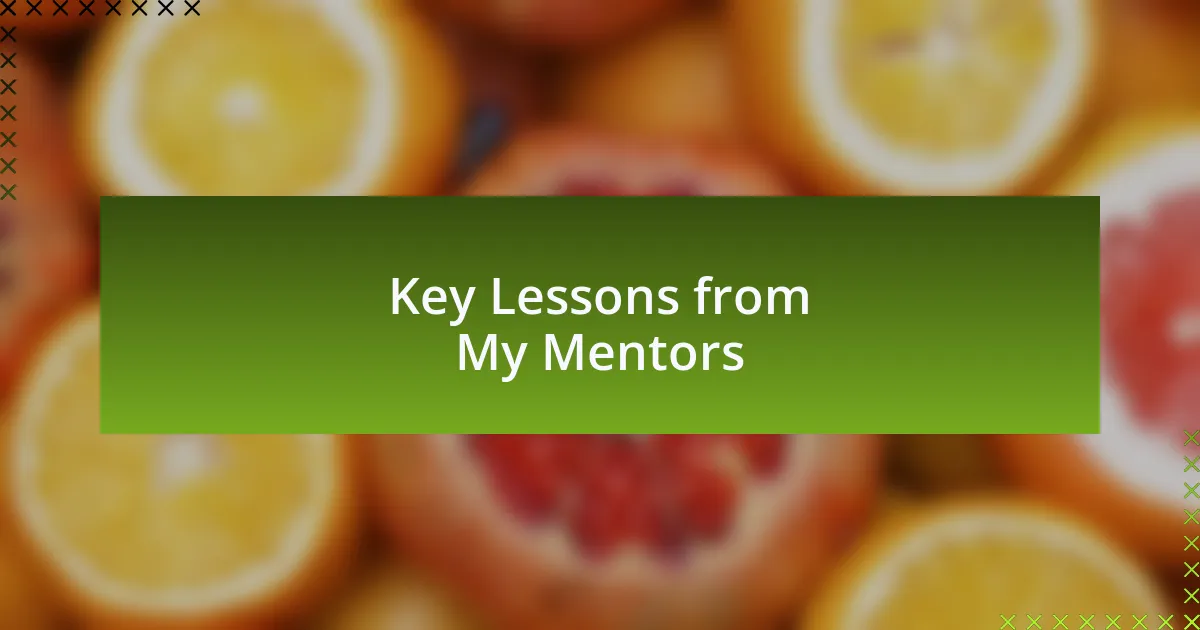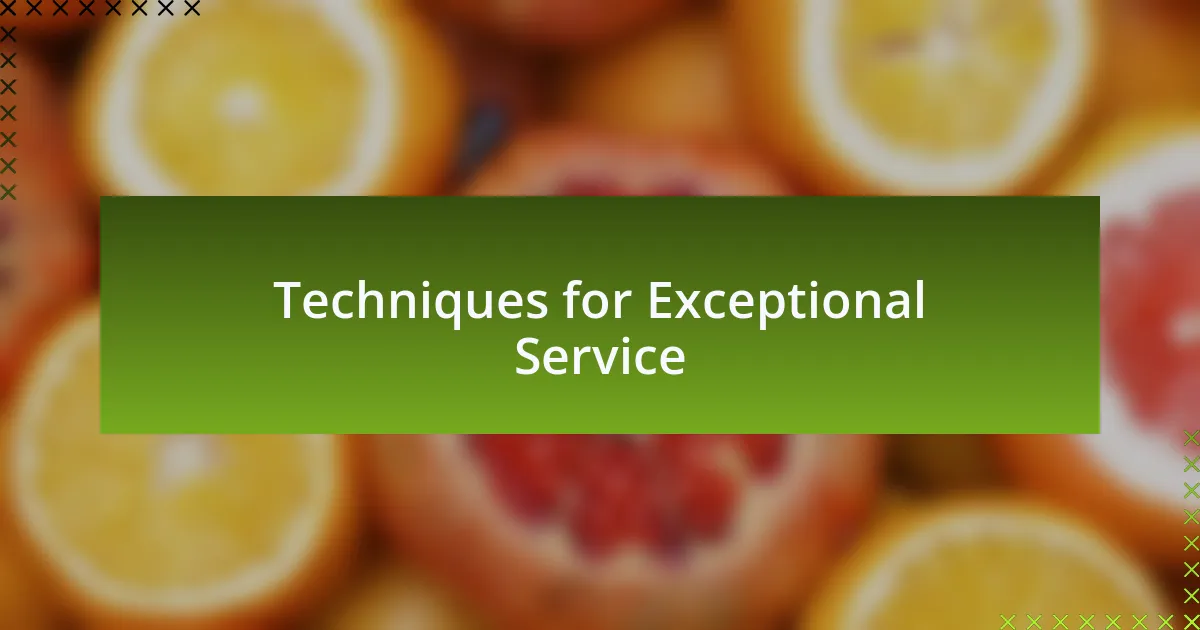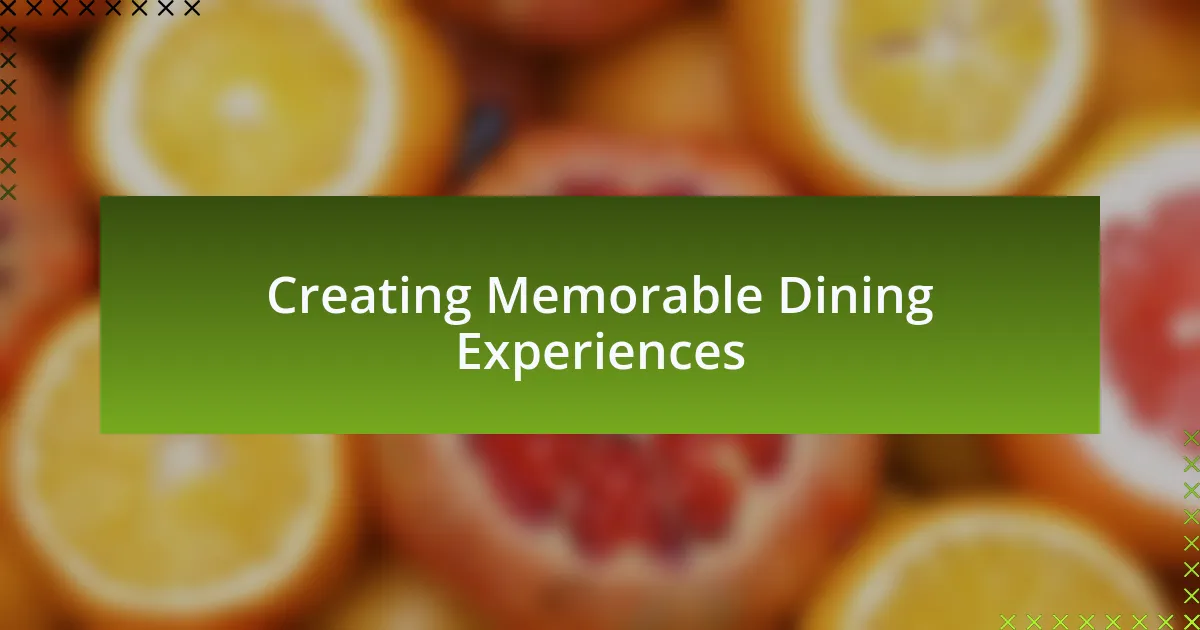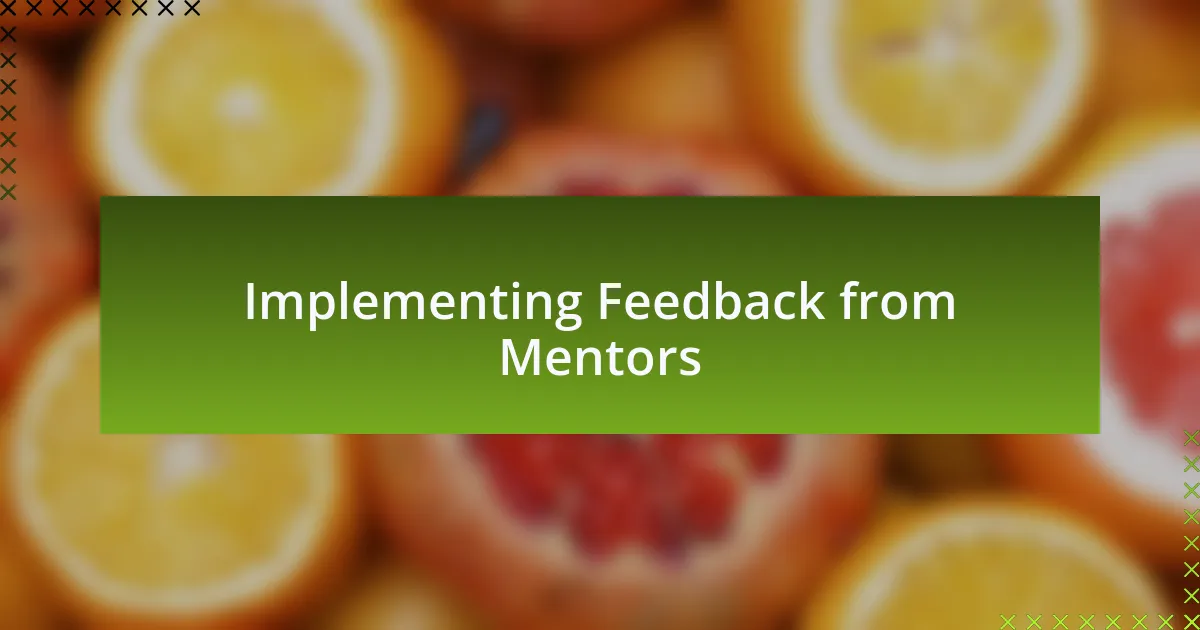Key takeaways:
- Fine dining is an immersive experience that involves high-quality ingredients, exceptional service, and attention to detail, creating a memorable journey for guests.
- Mentorship in hospitality bridges theoretical knowledge with practical experience, fostering skill development, emotional resilience, and a culture of excellence.
- Techniques such as anticipation in service, timing, and active listening significantly enhance the dining experience, making guests feel valued and cared for.
- Creating memorable dining experiences involves crafting emotional moments, incorporating personal touches, and using storytelling to deepen connections with guests.

Understanding Fine Dining Restaurants
When I first stepped into a fine dining restaurant, I was struck by the atmosphere—the soft lighting, elegant decor, and attentive service created an ambiance that felt almost otherworldly. It made me wonder: what truly sets fine dining apart from casual dining? It’s not just about the food; it’s an experience that engages all the senses, where every element is curated to delight and surprise.
Fine dining restaurants often focus on high-quality, seasonal ingredients, which I learned are vital for a memorable meal. I remember a chef mentor explaining how he sourced local produce, insisting that it not only enhances flavor but also supports sustainable practices. This dedication to quality is what elevates each dish, turning a meal into a culinary journey that invites exploration and appreciation.
Beyond the food, the service in fine dining is an art form in itself. There was a time when I observed a waiter gracefully balance multiple plates while anticipating guests’ needs without a word spoken. It made me realize that such attentiveness can transform the dining experience—how often do we truly feel seen and cared for while eating out? The nuanced interactions serve to create a sense of belonging, making each visit feel special.

Importance of Mentorship in Hospitality
Mentorship in hospitality creates an invaluable bridge between theoretical knowledge and practical application. During my early days, I had a mentor who would often say, “Experience is the best teacher, but a good mentor makes it more vivid.” I can still recall those intense late-night shifts when he patiently walked me through the nuances of wine pairing, transforming my confusion into confidence. Would I have grasped such complexities without his guidance? Probably not.
The support of a mentor fosters not just skill development but also emotional resilience. I vividly remember a difficult situation with a challenging guest. It was my mentor’s calm and tactful approach that helped me navigate the crisis. He taught me that empathy in hospitality is just as important as technical skills. How often do we underestimate the power of simply listening and understanding?
Moreover, mentorship nurtures a culture of excellence in fine dining. My own experience illustrates this perfectly—one mentor would share stories of his time in Michelin-starred kitchens, igniting a passion for perfection in each dish I prepared. It made me realize that every detail, no matter how minor, contributes to the overall experience. When we learn from those who have walked the path before us, we are inspired to carry forward that legacy of exceptional service.

Key Lessons from My Mentors
One key lesson I learned from my mentors is the importance of attention to detail, which often separates a good meal from a memorable dining experience. I recall a time when I was tasked with arranging a special evening for a couple celebrating their anniversary. My mentor emphasized that the little things, such as the perfect table setting and personalized touches, could elevate the night from ordinary to extraordinary. How many guests have left a restaurant only to remember the ambiance rather than the food?
Another valuable insight I gained was the significance of continuous learning and adaptability in our industry. During a hectic holiday season, I witnessed my mentor transform a frustrating mishap into a learning opportunity. A dish was sent back by a customer, not because it was poorly cooked, but due to a miscommunication about dietary restrictions. His calm demeanor in addressing the mistake taught me that flexibility and an open mind are crucial to evolving as a professional. Isn’t it interesting how our failures often end up being our greatest teachers?
Lastly, my mentors instilled in me the necessity of building genuine relationships with both colleagues and guests. I remember a mentor who made a point to memorize the names and favorite dishes of regular patrons. This effort not only fostered loyalty but also created an inviting atmosphere. It struck me how a simple greeting could turn a dining experience into a personal encounter. Isn’t it fascinating how creating connections transforms the dining scene into something much deeper than just serving food?

Techniques for Exceptional Service
One technique I find invaluable is the power of anticipation in service. I once observed my mentor noticing a guest looking around for their server. Without being asked, he stepped in to offer assistance, anticipating their needs before they verbalized them. This not only created a seamless experience but also made the guests feel truly cared for. When I reflect on this, I often wonder: how can we better predict our guests’ desires before they even express them?
Another approach my mentors emphasized is the importance of timing in service. There was a night when our restaurant was bustling, and I saw my mentor expertly navigate the flow of service. He knew just the right moment to check in with guests without interrupting their meal. This ability to read the room and sync with the dining pace left a lasting impression on me. Can good timing actually make the difference between an enjoyable meal and a disruptive one?
Lastly, the art of active listening is a technique I’ve learned through experience. During a busy evening, a guest once shared a story about a cherished family recipe, and I noticed how my mentor engaged with them deeply. He listened intently, validating their feelings and even suggesting a wine pairing that complement their memories. That connection didn’t just enhance the dining experience; it made the guest feel valued and understood. How often do we listen actively enough to truly connect with our guests on a deeper level?

Creating Memorable Dining Experiences
Creating memorable dining experiences goes beyond just serving food; it’s about crafting moments that linger in the mind long after the last sip of wine. I remember a particularly lavish dinner where the ambiance played a crucial role. The lighting was soft, and the music was subtle yet evocative. Guests often remarked on how the atmosphere made them feel at home while still being part of an extraordinary evening. How can we ensure that the environment we create aligns with the emotions we want our guests to feel?
Personal touches are another essential element I’ve learned to value. One evening, I decided to surprise a couple celebrating their anniversary with a custom dessert that highlighted their love story. The joy on their faces when I explained the significance of the dish was priceless. It’s incredible how a small, thoughtful gesture can elevate the overall experience and make guests feel special. What minor details can we introduce that would leave a lasting impression on our diners?
Lastly, storytelling plays an intrinsic role in enhancing dining encounters. I learned from a mentor who often shared the history behind each dish on the menu, creating a narrative that connected guests to the ingredients. One time, detailing the origins of a local herb led to a rich discussion at the table, sparking curiosity and engagement. Isn’t it fascinating how a simple story can draw people together and transform a meal into an experience filled with connection and discovery?

Implementing Feedback from Mentors
Implementing feedback from mentors has been transformative in my culinary journey. One piece of advice I received was to be open to criticism, especially during team tasting sessions. I remember my mentor urging me to listen closely when a dish didn’t resonate with diners. The moment I let go of my initial defensiveness and sought to understand their perspective, my dishes began to evolve in ways I never imagined. How often do we let pride cloud our ability to grow?
Another experience stands out when my mentor suggested I streamline my menu based on customer preferences. It felt daunting at first, but as I analyzed the data, I recognized patterns that guided me to reflect on what truly resonated with our guests. Simplifying the offerings not only reduced food waste but also allowed me to focus on perfecting signature dishes. Isn’t it interesting how listening to feedback can lead to clarity and direction in our culinary vision?
I also learned to embrace feedback in real-time during service. There was a night when an unexpected rush left us scrambling, and my mentor encouraged me to engage with diners about their wait experience. Instead of viewing complaints as negative exchanges, I found that addressing concerns turned into opportunities for connection. Have you ever noticed how addressing feedback directly can humanize the dining experience? Each interaction deepened my understanding of our guests, transforming feedback into a tool for building loyalty and trust.